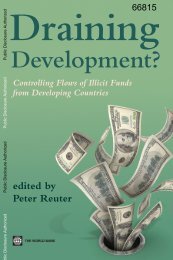International Trade in Services.pdf - DSpace at Khazar University
International Trade in Services.pdf - DSpace at Khazar University
International Trade in Services.pdf - DSpace at Khazar University
Create successful ePaper yourself
Turn your PDF publications into a flip-book with our unique Google optimized e-Paper software.
270 <strong>Intern<strong>at</strong>ional</strong> <strong>Trade</strong> <strong>in</strong> <strong>Services</strong><br />
Wh<strong>at</strong> Can Be Done to Harness <strong>Trade</strong> Opportunities<br />
Promot<strong>in</strong>g regul<strong>at</strong>ions <strong>at</strong> home and abroad th<strong>at</strong> are less<br />
trade restrictive<br />
Account<strong>in</strong>g is a highly regul<strong>at</strong>ed profession. Regul<strong>at</strong>ions aim to protect aga<strong>in</strong>st<br />
market failures, ensure good corpor<strong>at</strong>e behavior, and achieve societal objectives.<br />
Regul<strong>at</strong>ions can be the result of public policy processes and reflect sound policy<br />
objectives. For example, rules to protect aga<strong>in</strong>st market imperfections <strong>in</strong>clude<br />
qualific<strong>at</strong>ion requirements and technical standards <strong>in</strong> professional service sectors,<br />
prudential regul<strong>at</strong>ions <strong>in</strong> the f<strong>in</strong>ancial sector, and performance requirements <strong>in</strong> the<br />
telecommunic<strong>at</strong>ions sector. Regul<strong>at</strong>ions may also seek to achieve societal objectives.<br />
For <strong>in</strong>stance, competition policy can prohibit anticompetitive practices th<strong>at</strong> are<br />
detrimental to consumers. Investment policy can promote job cre<strong>at</strong>ion. Universal<br />
service rules can ensure access to telecommunic<strong>at</strong>ions, energy, and transport<strong>at</strong>ion.<br />
Regul<strong>at</strong>ions can have a substantial impact on the way firms oper<strong>at</strong>e and trade. See<br />
box 8.3 for examples of domestic regul<strong>at</strong>ions th<strong>at</strong> may impede trade <strong>in</strong> account<strong>in</strong>g<br />
services. 3 <strong>Intern<strong>at</strong>ional</strong> trade arrangements therefore recognize the importance of<br />
regul<strong>at</strong>ions and seek to ensure th<strong>at</strong> rules are not trade restrictive. For example, the<br />
GATS st<strong>at</strong>es th<strong>at</strong> World <strong>Trade</strong> Organiz<strong>at</strong>ion (WTO) members recognize “the right of<br />
Members to regul<strong>at</strong>e, and to <strong>in</strong>troduce new regul<strong>at</strong>ions, on the supply of services<br />
with<strong>in</strong> their territories <strong>in</strong> order to meet n<strong>at</strong>ional policy objectives” (WTO 1993, 285).<br />
Rules are assessed accord<strong>in</strong>g to their <strong>in</strong>fluence on trade r<strong>at</strong>her than the underly<strong>in</strong>g<br />
validity of their purpose. The challenge for policy makers is to ensure th<strong>at</strong> professional<br />
rules achieve policy objectives and are crafted to be no more trade restrictive<br />
than necessary. In sum, it is important to improve regul<strong>at</strong>ion, not <strong>in</strong>crease it.<br />
The government is not the only regul<strong>at</strong>or <strong>in</strong>terven<strong>in</strong>g <strong>in</strong> the profession. Professional<br />
bodies and oversight entities play an important role <strong>in</strong> the <strong>in</strong>dustry. From<br />
country to country, the organiz<strong>at</strong>ion of powers and responsibilities among the<br />
different regul<strong>at</strong>ors varies. The level of <strong>in</strong>dependence of professional bodies also<br />
varies. Oversight may touch on certific<strong>at</strong>ion for professionals, licens<strong>in</strong>g requirements<br />
for firms, and standards for account<strong>in</strong>g processes, as well as standards for the f<strong>in</strong>al<br />
service such as f<strong>in</strong>ancial reports and <strong>in</strong>come st<strong>at</strong>ements (WTO 2001).<br />
The organiz<strong>at</strong>ion of powers and responsibilities sometimes makes it difficult<br />
for the government or professional bodies to adopt rules th<strong>at</strong> are no more trade<br />
restrictive than necessary. In some countries, professional bodies are the ma<strong>in</strong><br />
promoters of trade liberaliz<strong>at</strong>ion. In other countries, they represent the vested<br />
<strong>in</strong>terests of the profession and oppose any k<strong>in</strong>d of market liberaliz<strong>at</strong>ion. It is the<br />
role of the government to ensure th<strong>at</strong> the <strong>in</strong>terests of users are equitably represented.<br />
Regul<strong>at</strong>ory entities can also improve the good governance of the sector<br />
and facilit<strong>at</strong>e trade by provid<strong>in</strong>g <strong>in</strong>quiry po<strong>in</strong>ts onl<strong>in</strong>e and facilit<strong>at</strong><strong>in</strong>g access to

















